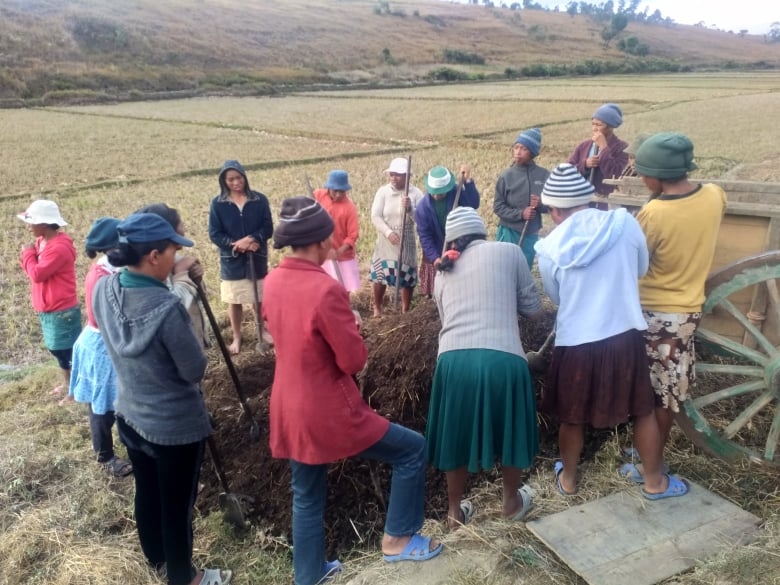Author: Vololontsoa Volatiana Razafindratoanina, DRAEP Analamanga
Women in Analamanga (the city region of Antananarivo) face considerable disadvantages in
developing and professionalising agricultural activities, but the Regional Director of the Ministry of Agriculture, Livestock and Fisheries (DRAEP) is planning initiatives to close the gender gap.
Women are majority participants in the rural economy of Analamanga. They make up around 60% of farmers in short supply chains and around 67% of members of cooperatives for shared use of agricultural machinery – yet 70% of them are vulnerable, according to the UN.
Gender differentiation is present at every level: in division of labour and production relations, in the production process, and in relative productivity. Women farmers are often managed by male-led operators who impose rules and conditions in their favour.
Women are more likely to face difficulties, financial and practical, to their personal development and empowerment. For example:
• most rural women cannot access finance as they have no capital, and must ask their husband before applying for a microloan;
• few own land, since under inheritance laws a woman is seventh in line to inherit her husband’s property (after children, his parents, his siblings, and other relatives);
• 80% of women are illiterate, having left school at age 8, which prevents them from completing paperwork (e.g. to apply for loans), keeping records, and following specifications;
• women are time-poor, juggling domestic and farming tasks and lacking access to time saving tools and machinery; having no-one to replace them in the fields prevents them from participating in training;
• many women farmers are unmarried mothers who work through pregnancy and breastfeeding, and many are undernourished;
• women in isolated areas lack access to climate change information services, and have no telephone so extension officers cannot contact them;
• domestic violence can prevent women from developing their activities, if a man feels threatened by his wife becoming independent.
Socio-economic factors make some women more vulnerable than others. One factor is marital status; unmarried mothers have no support. Another is age; older women receive no
pension so many continue working beyond the age of 60. Another is ethnicity; in some groups education of boys is prioritised, as girls are destined to marry. When girls leave school early to work in the fields, poor education holds back their development.

Shoot for the moon
At the level of the Ministry of Agriculture, Livestock and Fisheries (MAEP) no policies are being implemented to reduce difficulties faced by women. Some programmes have quotas for female participants but they lack action plans to engage with women.
At DRAEP Analamanga we are trying to put in place a local policy and programmes to reduce the gap between rural women and men and improve women’s lives. We must shoot for the moon if we want to reach the stars. For example, we should set up projects specifically to improve women’s production and productivity. We could develop the honey value chain and improve the ecosystem for bees, like the Bee Mada project in Bongolava Region, which provides livelihoods to 70 women in apiculture, agroforestry and dairy farming.
We should support women who have a professional project, who want to start their own agricultural business, or who wish to become operators, suppliers, or leaders of associations or groups. Support could be financial, or advice, or facilitating access to financial services, while taking into account their situation as mother, daughter, widow, etc. In some cases financial support of 500,000 Ar (€120) exists, but it is not enough to start a business.
Championing women in existing activities
In the UNDP-funded PACARC project (to improve adaption capacity and resilience of rural communities to climate change), most of the beneficiaries are women. We launched a competition to engage women members of farmer field schools in their personal development and empowerment. We will evaluate the women, the leaders of the field schools, and the field schools themselves, and award prizes to the most deserving.
As part of our regular work, DRAEP is responsible for rural public works and infrastructure, like renovating irrigated perimetres, repairing dams, building rice stores, providing drinking water, and constructing health facilities. We must get women involved in decision-making, because only women really understand the needs of other women and can represent them to state structures.
Social dialogue and lobbying
We need to initiate dialogue between national and local institutions to strengthen representation of women and ensure women’s voices are heard. This includes discussing social protection for vulnerable women, such as pensions for women over the age of 60, benefits for unmarried mothers, and support for women caring for sick children or husbands. It could also include ‘gender police’ to tackle domestic violence.
We must initiate dialogue and lobbying over changes we cannot make at the local level, like revising inheritance laws so women can inherit land, and enforcing the law prohibiting marriage of girls under 18 so that they remain in school. We could also cooperate with schools and other local entities to identify girls who show leadership qualities, so we can give them a helping hand to become agricultural leaders. When girls grow up to become leaders, they become role models in their communities.
This article was originally published in Urban Agriculture Magazine 37: Gender in Urban Food Systems.
